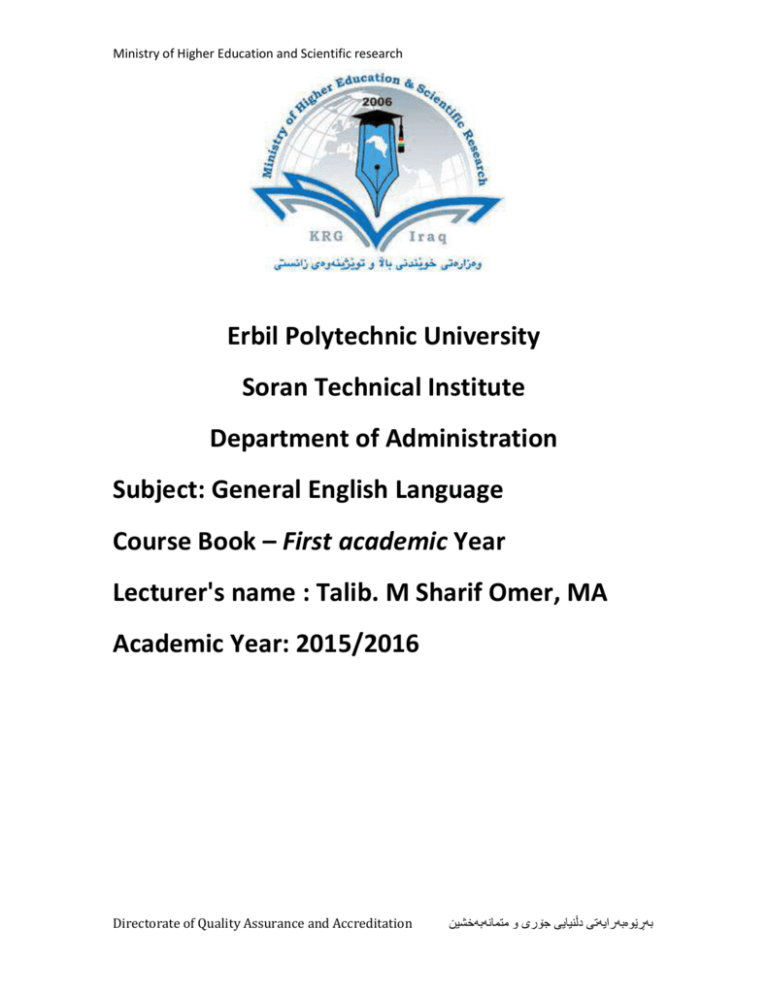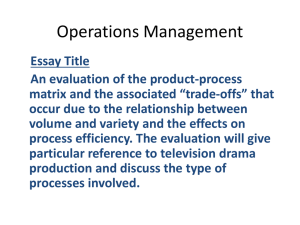
Ministry of Higher Education and Scientific research
Erbil Polytechnic University
Soran Technical Institute
Department of Administration
Subject: General English Language
Course Book – First academic Year
Lecturer's name : Talib. M Sharif Omer, MA
Academic Year: 2015/2016
Directorate of Quality Assurance and Accreditation
بهڕێوهبهرایهتی دڵنیایی جۆری و متمانهبهخشین
Ministry of Higher Education and Scientific research
Course Book
1. Course name
2. Lecturer in charge
3. Department/ College
4. Contact
5. Time (in hours) per week
6. Office hours
7. Course code
8. Teacher's academic profile
General English
Asst. Lecturer
Kurdish, Socio departments
e-mail: Talib.omer@soran.edu.iq
Tel: (optional)
Theory: 2
4
xx
I am Talib Muhammad Sharif Omer, M.A (Master of Arts)
degree holder in the field of English language teaching at the
University of Nottingham in the United Kingdom.
I taught a module 'General English' to undergraduates in
different academic departments such as Information
Technology, Management and Business in the years 2011,
2012, 2015 at Erbil Polytechnic University. As a lecturer in
the faculty of Arts at Soran University, I have successfully
taught a module 'English morphology' for the major classes.
Additionally, I have been a supervisor and coach for a
number of the undergraduate research students in 2011present. My prior educational experiences as a tutor showed
me the widespread using communicative competence
confronts the individual's essential need for communicating
naturally with natives in an academic context. Currently, my
research interest is to investigate the strategies of learning
vocabularies under the cognitive theories.
9. Keywords
Teaching, English, Research
10. Course overview:
This course-guide contains an outline of the module program, together with details of the
module aims and methods of assessment and a reading list for the first year academic students.
It has been designed for pre-intermediate students of other languages with the aim of
developing learner's fluency and accuracy in language usage. Alongside with the
communicative skills, the course will be focused on some basic grammatical tenses, modals and
descriptive adjective. The skills of writing, listening and reading comprehension will also be
highlighted.
Directorate of Quality Assurance and Accreditation
بهڕێوهبهرایهتی دڵنیایی جۆری و متمانهبهخشین
Ministry of Higher Education and Scientific research
11. Course objective:
To help students to communicate with English speakers and write some basic English letters.
It will also help them to understand English accents and know how to be autonomous in
language learning especially, in reading comprehension. This course also aims at support
students to have sufficient knowledge about grammatical rules and communication skills in
daily life.
12. Student's obligation
Each student is expected to be on time. Arriving late and leaving early is not allowed.
Dominating the class by one student is impossible.
Class discussion should be governed by appropriate behavior which shows respect to all.
In case of missing class for some health reasons, please contact to your department.
Ringing cell phones and phone conversations in the class is strictly prohibited.
Respect each class member's view during class discussions.
Listen carefully to what your classmates are saying and do not ridicule another class
member.
13. Forms of teaching
The sessions are (2hours) in per week. This will take the form of interactive lectures, pair work
and presentations with input from the tutor and a variety of reflective, analytical and evaluative
tasks and activities. The students will, at times be divided into smaller groups in class in order
to facilitate active involvement in practical tasks, discussions and the sharing of ideas and
experiences related to the week's topic. Learners should attend all sessions for the pursuit of
their studies, where students face difficulty in attending any such sessions or undertaking such
exams, it is their responsibility to inform their department/ lecturer of this fact and to provide a
satisfactory explanation.
14. Assessment scheme
Your exam papers will be marked by your tutor for a continuous assessment of score 30% and
10% will be given to those who actively participate and being polite during the class. The final
examination of score will be out of score 60%.
15. Student learning outcome:
By the end of the course, the students should be able to understand and communicate with
native speakers of the English language naturally.
1. Oral communication skills: Students will able to show the skills needed to participate in
Directorate of Quality Assurance and Accreditation
بهڕێوهبهرایهتی دڵنیایی جۆری و متمانهبهخشین
Ministry of Higher Education and Scientific research
a conversation that builds knowledge collaboratively.
2. Listening: Students will be able to listen native speakers in social situations.
3. Active reader and overwhelmed some ambiguities of vocabularies.
Be able to write message or letters effectively to variety of different settings.
16. Course Reading List and References:
Cunningham, S. (2012) Cutting-Edge Pre- Intermediate. Pearson: Longman.
Redston, C., Cunningham, S(2012) Face 2 face. Cambridge: Cambridge
University press.
http://www.bbc.co.uk/worldservice/learningenglish/grammar/pron/features/schwa/
http://www.talkenglish.com/
http://www.bbc.co.uk/learningenglish/english/course/intermediate/unit2/sessionhttp://www.learnamericanenglishonline.com/2
17. The Topics:
Week1: Introduction to the course
Lecturer's name
Talib
ex: (2 hrs)
Week2: Greetings and first meeting dialogues
Week3: Introducing themselves in formal and
ex: 14/10/2015
informal situations
Week4: What is important?
Week5: Question form: Present simple:
Leisure and lifestyle,
Week6: Past simple tense: time phrases and
words to describe feelings, pronunciation and
word stress.
Week7: At Rest and at Work: should and
shouldn't, daily routine jobs. Reading and
Listening
Week8: Special occasions: present continuous
and present simple: present continuous for
future arrangement
Week9: Appearance: comparative and
superlative adjectives with describing people.
Pronunciation and superlatives. Writing.
week10: Time off: intentions and wishes: going
to, planning to, would like to and would rather.
Directorate of Quality Assurance and Accreditation
بهڕێوهبهرایهتی دڵنیایی جۆری و متمانهبهخشین
Ministry of Higher Education and Scientific research
Listening activity and writing tasks
Week11: Present perfect and past simple with
for and other times : listening and talking
about your dreams
Week12: Using articles: quantitative with countable
and uncountable nouns. Reading tasks.
Week13 : Exchange Culture and social events
Week14: Modal verbs: may, might, will,
definitely…present tense after if, when, before
other words.
Week15: Used to and past continuous:
Week16: Present simple passive and past
simple passive: everyday objects : Reading.
Week17: Gerunds(ing forms) after verbs like
and dislike: reading and speaking tasks.
Week18: Academic conversation: Giving
opinions: agree& disagree.
Week19: Listening skills
Week2o: Translation: from English to Kurdish
language
Week21: Translation: from Kurdish as a
source language to the target language'
English'
Week22: Punctuation Marks
Week23: Reading text books and analyzing key
points
Wee24: Conversation and debate
Wee25: Real life tasks: visual aids, listening
and speaking.
Wee26: Task-based listening activity
Week27: Transportation Vocabulary in the
USA and UK
Week28 Speaking activity in different
situations : Supermarket, airport, train station
Week29: Free time conversation questions and
hobbies
Wee30: Free time political conversation and
opinions
Week31: Listening an watching video
Directorate of Quality Assurance and Accreditation
بهڕێوهبهرایهتی دڵنیایی جۆری و متمانهبهخشین
Ministry of Higher Education and Scientific research
week32 Review of the course
18. Practical Topics (If there is any)
No
In this section, the lecturer shall write titles of all practical
topics he/she is going to give during the term. This also
includes a brief description of the objectives of each topic,
date and time of the lecture
Lecturer's name
ex: (3-4 hrs)
ex: 14/10/2015
19. Examinations:
1. Compositional:
Write an essay about a topic that you are interested in. Your essay should explain why you like this topic .
Various communication services are available on the Internet, including electronic mail for sending and receiving
text messages and Internet Relay Chat which allows users to communicate using text messages in real time. An
Internet Service called File Transfer Protocol is used for transferring data or program files between powerful server
computers that provide the network services and the client computers that use the services for instance,
downloading music files
2. Q2- Write True if the statement is true or False if the statement wrong.
The term 'computer system' includes both the hardware and software. The hardware of a system consists of the
physical components that are connected together to function as a computer. The working and functioning of a
computer is run by the software. e or false type of exams:
1. The terms computer system excludes both the hardware and software.
2. The hardware of a system contains of the physical components that are linked together to act as a
computer.
1-False
2-True
3. Multiple choices:
1- Consider you are in a hospital and you have a runny nose, doctor says to you:
A. It sounds like you have the Flu.
B. I don’t feel well.
C. What medication can you give me?
Answer: A
20. Extra notes:
Directorate of Quality Assurance and Accreditation
بهڕێوهبهرایهتی دڵنیایی جۆری و متمانهبهخشین
Ministry of Higher Education and Scientific research
21. Peer review :
I am Salah Jameel Jabrael, holding MA in English language and Linguistics,
Sociolinguistics - Critical Discourse Analysis from Sheffield Hallam University in
the UK in 2013. My MA is mainly concerned with critically analysing skills of
communications in various contexts and pragmatics. Also it deals with how to
study dialectologies: accent, dialect, standard language and relevant areas
which are a part of sociolinguistics, the study of correlations between language
and social and cultural elements that affect it. Currently, I am an assistant
lecturer attached to Math department, Basic School, Faculty of Education, and
Soran University. Eventually, I am teaching General English at Faculty of
Education, Soran University and Communication at English Department –
Evening classes at the same Faculty.
.
Directorate of Quality Assurance and Accreditation
بهڕێوهبهرایهتی دڵنیایی جۆری و متمانهبهخشین





